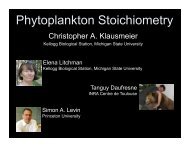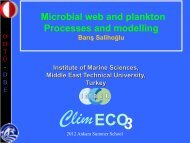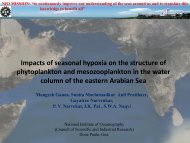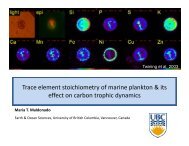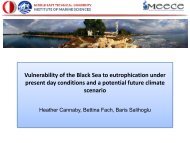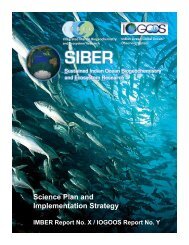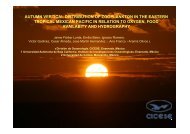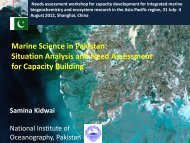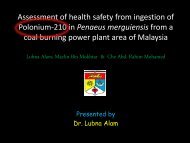SIBER SPIS sept 2011.pdf - IMBER
SIBER SPIS sept 2011.pdf - IMBER
SIBER SPIS sept 2011.pdf - IMBER
You also want an ePaper? Increase the reach of your titles
YUMPU automatically turns print PDFs into web optimized ePapers that Google loves.
<strong>SIBER</strong><br />
Science Plan and Implementation Strategy<br />
Sc i e n c e p l a n a n d<br />
i m p l e m e n t a t i o n s t r a t e g y<br />
This section provides additional background information, identifies the major science questions<br />
that need to be addressed in the IO, and provides the basis for the planning and development<br />
of <strong>SIBER</strong>. This will be supplemented by more detailed information for specific aspects of the<br />
program as it progresses.<br />
Int r o d u c t i o n to <strong>SIBER</strong><br />
<strong>SIBER</strong> (Sustained Indian Ocean Biogeochemistry and Ecosystem Research) is an international<br />
program that aims to advance understanding of biogeochemical cycles and ecosystem<br />
dynamics of the IO. The overarching goal of the program is to “understand the role of<br />
the IO in global biogeochemical cycles and the interaction between these cycles and<br />
marine ecosystem dynamics”. This understanding is required in order to predict the impacts<br />
of climate change, ocean acidification, eutrophication and harvesting on the global oceans and<br />
the Earth System. Such predictions are fundamental for policy makers to develop management<br />
strategies for the globally important IO. <strong>SIBER</strong> is therefore, highly relevant to the UNESCO<br />
Intergovernmental Oceanographic Commission (IOC) mission, by providing the underpinning<br />
science for the IOC’s four High Level Objectives, which span across the generic themes of<br />
marine hazards, climate change, ecosystem health and environmental management.<br />
To address this overarching goal, emphasis will be given to the analysis required to predict<br />
and evaluate impacts of natural and anthropogenic forcing on biogeochemical cycles and<br />
ecosystem dynamics in the IO. <strong>SIBER</strong> will leverage the sampling and observation activities of<br />
several coastal and open ocean observing systems (briefly discussed above and elaborated<br />
in the implementation plan below) that are being planned and deployed in the IO, and it will<br />
provide the basinwide scientific coordination required to predict IO biogeochemical cycles and<br />
ecosystem dynamics in the context of climate change and other anthropogenic influences.<br />
<strong>SIBER</strong> has been developed to conform to the goals and scientific themes of the <strong>IMBER</strong><br />
(Integrated Marine Biogeochemistry and Ecosystem Research) and IOGOOS (Indian<br />
Ocean Global Ocean Observing System) projects (Fig. 7). <strong>IMBER</strong>, with its focus on ocean<br />
biogeochemical cycles and ecosystems and their interactions, is building on the successes<br />
realized by the JGOFS and GLOBEC (Global Ocean Ecosystem Dynamics) projects. The<br />
<strong>IMBER</strong> vision is to “provide a comprehensive understanding of, and accurate predictive<br />
capacity for, ocean response to accelerating global change and the consequent effects on the<br />
Earth System and human society”. By contrast, IOGOOS is a regional association of marine<br />
operational and research agencies that aims to promote GOOS in the IO region. IOGOOS is<br />
designed to: 1) monitor, understand and predict weather and climate; 2) describe and forecast<br />
the state of the ocean, including living resources; 3) mitigate damage from natural hazards and<br />
pollution; 4) protect life and property on coasts and at sea; and 5) enable scientific research.<br />
<strong>SIBER</strong> is a regional program of <strong>IMBER</strong>, with strong links to and joint oversight by IOGOOS.<br />
One potential benefit of this dual programmatic structure will be to promote links and<br />
coordination between <strong>IMBER</strong> and IOGOOS.<br />
15



